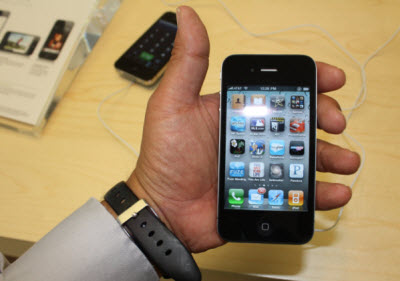The components in Apple’s iPhone 4 costs about $187.51, according to an estimate by market researcher iSuppli.
[aditude-amp id="flyingcarpet" targeting='{"env":"staging","page_type":"article","post_id":194599,"post_type":"story","post_chan":"none","tags":null,"ai":false,"category":"none","all_categories":"business,mobile,","session":"C"}']The estimate applies to the $199 model that ships with 16 gigabytes of memory. That gives Apple little breathing room to reap profits, considering the costs of research and development, Apple’s retail stores which sell the device, and its omnipresent marketing campaigns.
But in addition to the retail price the consumer pays, Apple is also believed to get a payment for each phone from AT&T, which has an exclusive on providing wireless service for the iPhones.
AI Weekly
The must-read newsletter for AI and Big Data industry written by Khari Johnson, Kyle Wiggers, and Seth Colaner.
Included with VentureBeat Insider and VentureBeat VIP memberships.
The estimates are based on a teardown analysis that iSuppli did after getting an iPhone 4 and ripping it apart. The numbers are always estimates because Apple has considerable power to negotiate the prices that it pays for buying components in high volumes.
Keeping the prices low on parts is key to Apple’s profits; the iPhone is now Apple’s bestselling product that accounts for 40 percent of revenue. The most expensive component is the 3.5-inch LCD screen that Apple calls a “retina display.” It costs $28.50 and is like made by LG Display.
Kevin Keller, an analyst at iSuppli, told Bloomberg Businessweek that the iPhone’s costs have generally been about $170 to $180 over the years. The estimate doesn’t include other product-related costs such as shipping, ads, software development, labor, or patents.
Besides the sharper display, the new iPhone packs in new capabilities such as the FaceTime video phone and multitasking software. The 1-gigahertz A4 microprocessor (which combines graphics and a microprocessor in the same device) was also used in the iPad. Samsung Electronics makes that chip, which is designed by Apple’s own engineers, for $10.75, iSuppli says.
Other suppliers include Broadcom, which makes the wireless chip that handles Wi-Fi and Bluetooth connectivity, as well as another chip that provides global positioning system (GPS) navigation. Previously, Infinenon Technologies provided the GPS chip.
One component that is new for the iPhone is its gyroscope chip, which is made by ST Microelectronics. ST provides that chip for $2.60, as well as an accelerometer chip for 65 cents. Both allow the iPhone 4 to determine which direction it is facing. They allow users to control the phone by shaking it. The glass atop the display creates touchscreen capability for the phone. That glass is made by Taiwan’s Wintek and a joint venture called TPK-Balda. Other suppliers include Skyworks Solutions and TriQuint Semiconductor.
[aditude-amp id="medium1" targeting='{"env":"staging","page_type":"article","post_id":194599,"post_type":"story","post_chan":"none","tags":null,"ai":false,"category":"none","all_categories":"business,mobile,","session":"C"}']
VentureBeat's mission is to be a digital town square for technical decision-makers to gain knowledge about transformative enterprise technology and transact. Learn More

